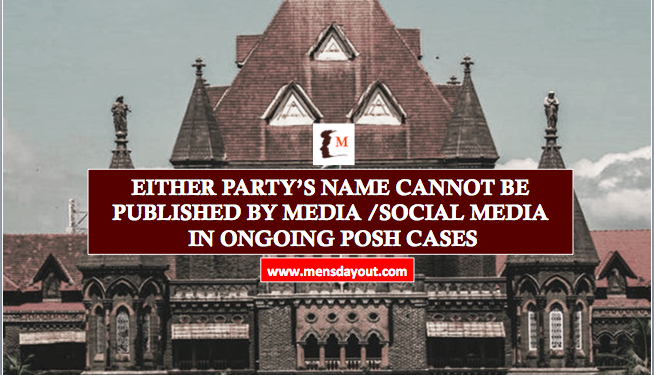In what could be seen as a victory of sorts for falsely accused Men, the Bombay High Court in its recent guidelines – for cases related to Sexual Harassment of Women at the Workplaces – has directed that such matters will be heard either in-camera or in the judge’s chambers. The high court further stated that orders are not to be passed in open court and should not be uploaded on the official HC website either.
A bench of Justice Gautam Patel has further barred the media from publishing proceedings under the Sexual Harassment of Women at the Workplace (Prevention, Prohibition and Redressal) Act, 2013 or reporting on a judgement without the court’s permission.
For Media Reporting
Breach of the guidelines or publishing any party’s name or their information, even if it is in public domain would amount to contempt of court, as per these guidelines. With regards to media disclosure, the court said:
Both sides and all parties and advocates, as also witnesses, are forbidden from disclosing the contents of any order, judgment or filing to the media or publishing any such material in any mode or fashion by any means, including social media, without specific leave of the court.
The guidelines deal with the format of orders in POSH (POLICY FOR PREVENTION OF SEXUAL HARASSMENT) cases, filing protocols, grant of access by the registry, conducting hearings, directions to the certified copy depar
Justice Patel said that as of now, there are no established guidelines for such matters and the guidelines were a “minimum requirement.” The court said,
It is imperative to protect the identities of the parties from disclosure, even accidental disclosure, in these proceedings. This is in the interest of both sides. There appear to be no established guidelines so far in such matters.
This order setting out a working protocol for future orders, hearings and case file management is a first endeavour in that direction. These are only initial guidelines, and will necessarily be subject to revision or modification as needed. I would suggest that these guidelines are the minimum required.
However, such guidelines may make media reporting on POSH cases completely out of bounds.
Guidelines
-
In all orders, the endeavour will be to anonymise the identities of the parties.
(a) In the order sheets, the names of the parties will not be mentioned. The orders will read “A v B”, “P vs D” etc.
(b) In the body of the order, the parties will not be referred to by their names but only as Plaintiff, Defendant No.1 etc.
(d) Orders/judgments on merits will not be uploaded. Because this order sets out general guidelines and does not address the merits, it is permitted to be uploaded.
(e) All orders and judgments will be delivered in private, that is to say, not pronounced in open court but only in Chambers or in-camera.
Public Access – Orders Can’t be Published Without Court’s Direction
(a) If any order is to be released into the public domain, this will require a specific order of the Court.
(b) This will be on the condition that only the fully anonymised version of the order of judgement is let into the public domain for publication.
Hearings & Access
(a) The Registry will not permit anyone other than the Advocate-on-Record with a current and valid vakalatnama to take inspection or copies of any filing or order.
(b) The entire record is to be kept sealed and is not to be given to any person without an order of the Court.
(c) Witness depositions will not be uploaded under any circumstances.
(d) All hearings will only be in Chambers or in-camera and no online or hybrid facility for hearings.
(c) Only the advocates and the litigants are permitted to attend hearings. Support staff (clerks, peons, etc), must leave the Court.
(d) Except the Court Master/Associate or Sheristedar and the stenographer or person providing secretarial assistance, other Court staff must also leave the court and not be present at the hearing.
Breach – Contempt of Court
(a) The prohibition on publishing the names, address or other PII of the parties is absolute.
(b) It will continue to apply where that information about the parties has been obtained by using the contents of a judgment or order to discover information already in the public domain.
(c) All persons, including the media, are required to ensure strict compliance with these conditions of anonymity. Failure to do so will be a contempt of court.
ALSO READ –
Times Network Woman Journalist Accuses Top Management Employee Of Sexual Misconduct After ‘Termination Of Her Services’
Assam University Professor Dies Of Suicide After Being Named In Harassment Case By Girl Student
“Extracting Work From Women Is Not Sexual Harassment” : Madras High Court
#MeTooIndia | Anonymous Handles Cannot Become Judge In Their Own Case Not Allowing Accused To Defend Himself
“I want you to be strong & live your life with whole respect, as your husband has not done anything”: Swaroop Raj
ALSO WATCH –
Interview | Abhijit Iyer-Mitra Discusses Menace Of False Rape Cases In India
Join our Facebook Group or follow us on social media by clicking on the icons below
Join our Facebook Group or follow us on social media by clicking on the icons below
If you find value in our work, you may choose to donate to Voice For Men Foundation via Milaap OR via UPI: voiceformenindia@hdfcbank (80G tax exemption applicable)































